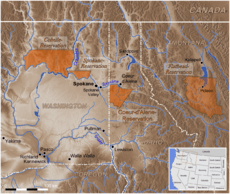Jacques Raphael Finlay facts for kids
Quick facts for kids
Jacques Raphaël Finlay
|
|
|---|---|
| Born | 1768 Finlay Fort, near Nipawin Rapids, Saskatchewan River, Canada
|
| Died | 1828 Spokane House, Oregon Country
|
| Burial place | Beneath the Old Bastion, Spokane House, Oregon Country |
| Nationality | French Canadian |
| Other names | Jaco or Jacco |
| Occupation | Fur trader, scout, and explorer |
| Parent(s) | John Finlay |
Jacques Raphaël Finlay (1768–1828), often called Jaco or Jacco (pronounced Jocko), was an important Canadian fur trader, scout, and explorer. He worked with the North West Company, a big fur trading business.
Finlay built two important fur-trading posts: Spokane House and Kootanae House. He also helped the famous explorer David Thompson cross the Rocky Mountains. This journey helped Thompson discover the Columbia River.
Contents
About Jacques Finlay
Finlay was born in 1768 near the Saskatchewan River. His mother was from the Chippewa tribe of Native Americans. His father was James Finlay, a fur trader from the North West Company.
By 1799, Finlay was working as a clerk for the North West Company. This was a high position for people of mixed heritage at that time. He was paid as much as David Thompson, which showed how much they valued his skills as a scout.
Exploring with David Thompson
In 1806, Thompson hired Finlay to find a path through the Rocky Mountains. This path crossed the Continental Divide, a line where rivers flow to different oceans. Thompson followed this trail in 1807.
Finlay also played a big part in Thompson's discovery of the Columbia River. He helped by scouting ahead, storing supplies, and building canoes. These were all very important jobs for such a long journey.
Later Life and Work
After Thompson went back east, Finlay worked for the Pacific Fur Company. He was able to read and write, which was helpful for his work.
Later, he returned to the North West Company. This happened when the North West Company bought the Pacific Fur Company during the War of 1812. Finlay stayed with them until 1816, along with three of his sons.
He then took over an old Hudson's Bay Company trading post. In 1826, a botanist named David Douglas visited him there. Douglas even wrote down a recipe for bread that Finlay made from local lichens.
Finlay died in 1828 and was buried at Spokane House. Years later, in 1833, another explorer named Nathaniel Jarvis Wyeth saw the abandoned site. He noted that only one building was left, kept as a mark of respect for a clerk buried there.
In 1950, a construction team found the old site. They discovered Finlay's body along with items like a clay pipe marked "JF."
Finlay's Family Today
Finlay had many children. His descendants live throughout the Northwest today. You can find them on the Flathead, Colville, Spokane, Kalispel, Coeur D'Alene, and Umpqua Indian Reservations.
An early settler named Jacob Allen Meyers wrote about Finlay's family. He said they were known for being strong and capable.
What He Left Behind
The Jocko Valley and the Jocko River in Montana are named after Jacques Finlay.
 | Toni Morrison |
 | Barack Obama |
 | Martin Luther King Jr. |
 | Ralph Bunche |


